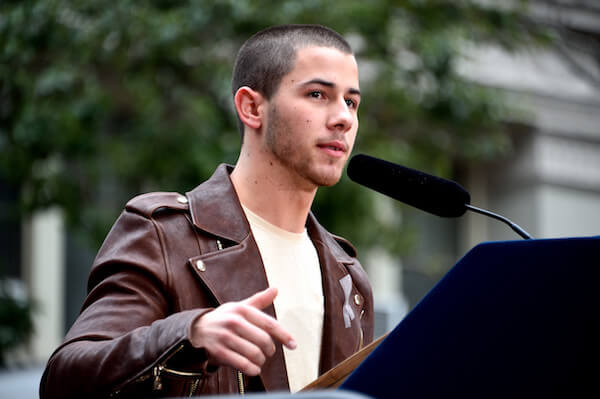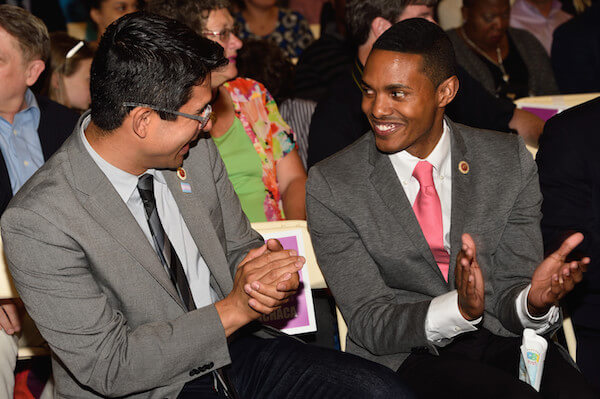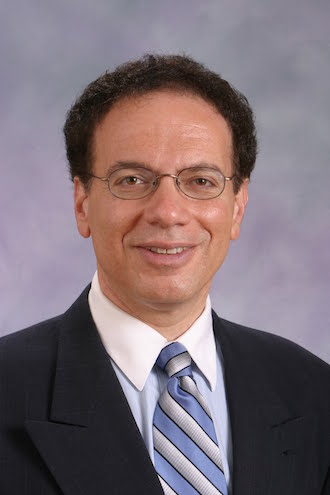Judge Doris Ling-Cohan at a September 19 rally supporting her at the Henrietta Hudson bar in the West Village. | DONNA ACETO
Justice Doris Ling-Cohan, a distinguished jurist and champion of the rights of tenants, immigrants, and LGBT people, was re-nominated by acclamation for a 14-year term to the New York State Supreme Court by delegates to Manhattan’s County Democratic Judicial Convention on September 22.
Ling-Cohan’s nomination came as a welcome vindication after her narrow rejection, in a 12-10 vote, by an independent screening panel fraught with irregularities — a panel that tried to reverse itself, with 16 of its members sending a letter to the county Democratic leader, Assemblymember Keith Wright, stating that she “merits continuation in office.”
“This is not just my victory,” Ling-Cohan said in her acceptance speech. “This is a victory for an independent judiciary.”
Calls escalate for reform of New York County’s Democratic judicial panel screening process
The panel’s letter asking to reverse its decision not to support her renomination was rejected, in a September 7 emergency meeting that Wright called, by the county’s Democratic district leaders, who were advised they legally could not accept a change.
The county also initially took the position that Ling-Cohan could not be nominated from the convention floor, until out lesbian City Councilmember Rosie Mendez, an attorney and longtime ally of the judge, read the rules and found that the only restriction on nominations at the convention not earlier approved by the panel was that they could not be made by members of the county executive committee made up of the district leaders.
Mendez had Ling-Cohan’s name put in nomination at the Harlem Hospital convention last night by veteran delegate Al Handel, who called her a “trailblazer” to the loudest cheers of the night, amplified by hundreds of Ling-Cohan supporters from Asian-American communities wearing red in solidarity with her.
“She was under attack by some trying to rid the bench of this hero,” Handel said, praising her for her support of “tenant rights, consumer rights, labor rights, and LGBT rights with an unblemished body of work.”
He said, “We must not let those trying to destroy our independent judiciary win.”
Like Ling-Cohan, all of the other eight who won slots on this November’s ballot –– including incumbents Rosalyn Richter, an out lesbian, and Dominican-American Rolando Acosta, who are both now associate justices of the Appellate Division –– were approved unanimously at the convention.
Ling-Cohan was the first Asian-American woman elevated to the Appellate Term in 2014 and was the first be elected to State Supreme Court, in 2002.
Ling-Cohan with a key supporter, City Councilmember Rosie Mendez, who demonstrated to Democratic officials that rules clearly allowed the judge to be nominated from the floor at the county convention. | GAY CITY NEWS
Part of the reason support for Ling-Cohan was so fervent is because the vaunted panel review process was so flawed and anonymous attacks on her in the press were so vicious, starting in the New York Post but repeated uncritically by other outlets, requoting the Post “source” — allegedly from the panel but possibly a self-interested operative for another judicial candidate — who called her “slow” and “lazy,” when even a cursory check of court records shows her output to be above average.
Fourteen panel members wrote a letter saying these attacks on Ling-Cohan were never spoken of in their deliberations. But no reporter has been able to uncover the Post’s anonymous source, though some investigators say they are closing in on him or her.
What is known is that Deborah Riegel, a real estate lawyer on the panel, had an ax to grind against Ling-Cohan and swayed a majority with her criticisms of the judge’s insistence that attorney motions in cases of temporary restraining orders in tenant eviction cases be put in writing to create a record — not a usual practice but well within judicial discretion.
According to the standards the panel was supposed to follow, that did not amount to grounds for not approving an incumbent judge such as Ling-Cohan who has faced no disciplinary actions or even written complaints against her.
Riegel works for Rosenberg & Estis, a firm that lost a major case before Ling-Cohan, a conflict that supporters of the judge said in a leaflet was “undisclosed.”
Beyond Riegel’s role and characterizations of the process as “chaotic” by one panelist, criticism has also fallen upon panelist Brenda Gill, an attorney who said during deliberations, “I don’t care what the standard is, I am voting my conscience” — a statement that “runs directly afoul of a clear-cut Democratic rule” for this process, according to former New York Law Journal reporter Dan Wise’s WiseLawNY blog, which reported it.
Worse, Gill’s rogue interpretation of the rules was not taken to task by the panel administrator, Cyril “Ken” Bedford, a former law partner of Gregory Soumas, whom County leader Wright unsuccessfully pushed for president of the Board of Elections.
Critics of the once-revered independent screening panels now abound, including Ling-Cohan herself, who said the process at least needs to be “tweaked” by having the county consider the standard in Brooklyn that requires a 75 percent negative vote for an incumbent not to be “continued” for renomination. Without such a standard, reform advocates argue, sitting judges will not be able to maintain their independence, constantly worried about making decisions that will rub the lawyers who sit on the screening panels the wrong way.
Alan Flacks, a delegate for 35 years, said, “I believe Keith Wright has destroyed the panel screening process” and blamed him and New York County Democratic Committee counsel Jeanine Johnson, a longtime aide to Wright, for installing Bedford –– “the cause of all this mess” –– as administrator.
Wright said that while he disagreed with the panel’s original conclusion, accepting its remorseful reversal would be illegal and essentially make him into a “boss.” He clearly did work behind the scenes to see to it that Ling-Cohan was re-nominated after the panel debacle –– once Mendez gave him a way out by clarifying that she could be nominated from the floor.
Wright opened the convention by proclaiming, “This panel process is still the best process in all the counties and throughout the country,” though it has no avenue for appeal, as some counties do, if a candidate is treated unfairly in the way Ling-Cohan was.
“We are inclusive and transparent and make sure we have the best judges that we can be proud of,” Wright asserted.
And while he said the county’s judicial nomination procedures are not “a Soviet-style process,” there was nary a floor fight nor one note of dissent over any of the nominations.
“This process has gotten crazy,” Wright said, “but tonight it will go smoother.”
He announced a one-minute limit on all nomination speeches and said, “I will be a b-i-t-c-h about that.”
Former county leader Denny Farrell, a longtime assemblymember from Harlem as Wright is, strongly defended the panel system, but conceded, “It is hard to get an administrator to do the job.”
It is also hard to find panelists who represent the people of Manhattan. The county asks bar associations and community groups to send panelists, but 17 of 39 groups that were asked declined this year, leaving the panel top-heavy with attorneys.
Daniel Roskoff, a longtime community activist who is managing Ling-Cohan’s bid, proposed that the panel be reformed by “1) following American Bar Association guidelines for incumbents, 2) change the threshold for incumbents to a 75-percent negative vote for rejection, 3) allow appeals, and 4) vet panelists for conflicts.”
Attorney Emily Jane Goodman, a 30-year veteran of the bench and a big Ling-Cohan supporter, defended electing judges over having them appointed by the governor and mayor. She called for training of the panelists and having them disclose potential conflicts “in sworn statements.”
Having served as an administrator of panels twice herself, Goodman said, “I know how [an administrator] can affect a panel,” and voiced concern that the rules weren’t followed this year.
The County Democratic Party may have dodged a scandal this year, but it remains to be seen how seriously it will take the need to reform the screening process. One veteran of the local Democratic clubs conceded that without judicial candidates, the clubs would die as those seeking judicial office –– or who hope to in later years ––provide a substantial percentage of club revenue through their attendance at fundraisers.
Given the lack of any real competition for judicial nominees running on the Democratic ballot line, Ling-Cohan will most surely be returned to the bench in November. She enjoyed a night of celebration with her supporters after being dragged through the mud by the gutter press and only later affirmed in a big September 6 City Hall rally and finally at the convention. But the story of her vindication and the future of an independent judiciary is still being written.



































